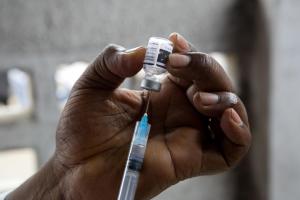Nine African countries agree to begin journey towards pooled procurement to increase their access to affordable life-saving vaccines
Brazzaville, 6 November 2019 – Nine middle-income countries in Africa have agreed to work towards pooled procurement mechanisms by first sharing vital information on their vaccine purchasing practices, including the prices they pay and their suppliers. Sharing information and ultimately pooling their orders will better leverage their individual purchasing power and thus strengthen their vaccine security and increase their access to affordable life-saving vaccines.
Their commitment on 1 November to improve in-country and cross-border processes was made following a three-day workshop organized by the World Health Organization (WHO) Regional Office for Africa in Mbabane, Kingdom of Eswatini to address access to safe and affordable vaccines in middle-income countries, where immunization coverage is decreasing.
The workshop brought together the countries that, due to their middle-income status, are not eligible for immunization financing support from Gavi, the Vaccine Alliance (Algeria, Botswana, Cabo Verde, Kingdom of Eswatini, Gabon, Mauritius, Namibia, São Tomé and Príncipe and Seychelles). Participants included officials from the respective health and finance ministries, procurement officials, immunization officers and members of national regulatory authorities for vaccines and medicines.
Despite progress in reducing morbidity and mortality due to vaccine-preventable diseases, around 8.5 million children living in the WHO African Region still do not receive all the basic and necessary vaccines. With many middle-income countries in the region transitioning from donor-supported to domestically funded immunization programmes, access to vaccines remains a challenge due to limited financial resources and to obstacles in accessing a timely and affordable vaccine supply.
A shift towards more strategic approaches to vaccine procurement is critical to improve access to affordable vaccines for middle-income countries in the African Region.
The nine countries agreed on activities to be conducted in common that will work towards a pooled procurement process in the future. These activities include coordinating joint market research, sharing vaccine supplier information and monitoring vaccine prices. By coordinating the informed buying of vaccines, these countries will have greater stability in their vaccine supply as well as increased bargaining power for lower prices.
Five of the countries, those in the regional organization of Small Island Developing States, have already created a single purchasing bloc, which was highlighted during the workshop as an innovative model due to its ability to leverage a better negotiating position and thus achieve reduced prices. Pooling demand can be particularly beneficial to countries with small populations that combine their orders to improve their negotiation terms with suppliers.
Pooled procurement also contributes towards strengthening existing specialized skills for national vaccine procurement and allows for continuous stability in vaccine supply.
The country representatives agreed on collaborating with different models of group purchasing, with all committing to share information and some agreeing to work towards joint price negotiating.
"Pooling vaccine procurement is a major step towards increasing immunization coverage in these countries and the African Region as a whole,” said Dr Matshidiso Moeti, WHO Regional Director for Africa. “We must work together to improve vaccine delivery so that all children are protected from preventable diseases. I am heartened to see such strong cooperation between countries to make universal immunization coverage a reality.”
The workshop followed a consultative meeting organized in April 2018 by the WHO Regional Office for Africa, during which 17 low-, middle- and upper-middle-income countries in the African Region called for improved procurement skills and knowledge, harmonized product choice and registration processes and the use of pooled procurement options to enhance vaccine security.
On the final day of the recent workshop, the nine countries agreed on the next steps in the areas of advocacy, decision-making, regulation and information exchange.
- Create a dedicated web-based community platform for information exchange.
- Set up or leverage upcoming opportunities for regular information sharing and discussion on market information, national immunization technical advisory group discussions and decisions and on product registration information.
- Utilize the platforms of the African Union, the Regional Economic Communities and the Pan-African Parliamentarian Caucus on immunization for high-level political engagement to raise the profile of immunization.
- Through the WHO Regional Office for Africa, commit to engage with the African Vaccine Regulatory Forum and the African Medicines Regulatory Harmonization Initiative to ensure inclusion in the effort, beginning with simple devices, such as auto-disabled syringes.
Immunization Financial Sustainability Officer IVD
WHO Regional Office for Africa
Email: petua [at] who.int (petua[at]who[dot]int)
Tel: +263 77 41 71 127
Communications and marketing officer
Tel: + 242 06 520 65 65 (WhatsApp)
Email: boakyeagyemangc [at] who.int (boakyeagyemangc[at]who[dot]int)



